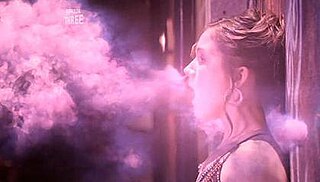
Robert Llewellyn is a British actor, comedian, presenter and writer. He plays the mechanoid Kryten in the sci-fi television sitcom Red Dwarf and formerly presented the engineering gameshow Scrapheap Challenge. He has also founded and hosts a YouTube series, Fully Charged., which has grown into a company that puts on EV and "Everything Electric" conventions in the UK, USA, Canada, Australia and Europe".

Walking with Dinosaurs is a 1999 six-part nature documentary television miniseries created by Tim Haines and produced by the BBC Studios Science Unit, the Discovery Channel and BBC Worldwide, in association with TV Asahi, ProSieben and France 3. Envisioned as the first "Natural History of Dinosaurs", Walking with Dinosaurs depicts dinosaurs and other Mesozoic animals as living animals in the style of a traditional nature documentary. The series first aired on the BBC in the United Kingdom in 1999 with narration by Kenneth Branagh. The series was subsequently aired in North America on the Discovery Channel in 2000, with Avery Brooks replacing Branagh.
Parameters Rough Science is a British documentary reality television series made by the BBC in collaboration with the Open University. Six series were made between 2000 and 2005. It was broadcast in prime time on BBC Two and is considered something of a "break-out hit" for the Open University.

Star Cops is a British science fiction television drama series first broadcast on BBC2 in 1987. It was devised by Chris Boucher, a writer who had previously worked on the science fiction television series Doctor Who and Blake's 7, as well as crime dramas such as Juliet Bravo and Bergerac.
"Army of Ghosts" is the twelfth and penultimate episode in the second series of the British science fiction television programme Doctor Who which was first broadcast on BBC One on 1 July 2006. It is the first episode of a two-part story; the concluding episode, "Doomsday", was first broadcast on 8 July.
The cast of the television series MythBusters perform experiments to verify or debunk urban legends, old wives' tales, and the like. This is a list of the various myths tested on the show, as well as the results of the experiments.

"Day One" is the second episode of the first series of the British science fiction television series Torchwood. Directed by Brian Kelly, the episode was first broadcast on the digital channel BBC Three on 22 October 2006 with the series pilot, "Everything Changes", and later repeated on terrestrial channel BBC Two on 25 October. It was the first work in the Doctor Who universe to be written by future Doctor Who showrunner Chris Chibnall.
"Marooned" is the second episode of science fiction sitcom Red Dwarf Series III, and the fourteenth in the series run. It premiered on the British television channel BBC2 on 21 November 1989. Written by Rob Grant and Doug Naylor, and directed by Ed Bye, the story is about Lister and Rimmer being marooned together on a bleak ice planet. The episode was re-mastered, along with the rest of the first three series, in 1998.
"Camille" is the first episode of science fiction sitcom Red Dwarf Series IV, and the nineteenth episode in the series run. It was first broadcast on the British television channel BBC2 on 14 February 1991. The episode was planned to be shown third, but was moved forward in the schedule to be shown on Valentine's Day. Written by Rob Grant and Doug Naylor, and directed by Ed Bye. The episode, a parody of the film Casablanca, sees Kryten rescue and fall in love with an android who appears to be the same model as himself.
"Back to Reality" is the sixth and final episode of the fifth series of science fiction sitcom Red Dwarf, and the 30th in the series' run. It was first broadcast on the British television channel BBC2 on 26 March 1992, written by Rob Grant and Doug Naylor and directed by Juliet May and Grant Naylor. The plot features the crew waking up after a crash to discover that the last four years of their lives has been spent in a "Total Immersion Video Game" called Red Dwarf. This episode marks the final appearance of Hattie Hayridge as Holly. The episode often tops polls and surveys as the best episode in the entire series.
"Backwards" is the first episode of science fiction sitcom Red Dwarf Series III, and the thirteenth in the series run. It premiered on the British television channel BBC2 on 14 November 1989. Written by Rob Grant and Doug Naylor, and directed by Ed Bye, the episode has the crew travel to an alternate Earth where time runs backwards.
The cast of the television series MythBusters performs experiments to verify or debunk urban legends, old wives' tales, and the like. This is a list of the various myths tested on the show, as well as the results of the experiments.
"Looking After Our Own" is the second episode of the British espionage television series Spooks. It first aired on BBC One in the United Kingdom on 20 May 2002. The episode was written by series creator David Wolstencroft, and directed by Bharat Nalluri. The episode focuses on MI5's efforts in bringing down right-wing leader Robert Osbourne, who is believed to be planning a series of race riots across the UK.
This is a list of British television related events from 1993.
This is a list of British television related events from 1986.

The Vega Science Trust was a not-for-profit organisation which provided a platform from which scientists can communicate directly with the public on science by using moving image, sound and other related means. The Trust closed in 2012 but the website and streaming video remains active.

Inside No. 9 is a British black comedy anthology television programme that first aired in 2014. It is written by Reece Shearsmith and Steve Pemberton and produced by the BBC. Each 30-minute episode is a self-contained story with new characters and a new setting, almost all starring Pemberton or Shearsmith. Aside from the writers, each episode has a new cast, allowing Inside No. 9 to attract a number of well-known actors. The stories are linked only by the number 9 in some way, typically taking the form of a door marked with the number 9, and a brass hare statue that is in the background of all episodes. Themes and tone vary from episode to episode, but all have elements of comedy and horror or perverse humour, in addition to a plot twist. Pemberton and Shearsmith took inspiration for Inside No. 9 from an episode of Psychoville, a previous project, which was filmed in a single room – this in turn was inspired by Alfred Hitchcock's Rope.
This is a timeline of the history of BBC Two.
"Next of Kin" is a two-part episode of the British medical drama Casualty that served as the 15th and 16th episodes of the show's twenty-sixth series, and the 796th and 797th episodes overall. The first part premiered on 3 December 2011, and the second on 10 December 2011 on BBC One and BBC One HD in the United Kingdom. Both parts were directed by Simon Massey; part one was written by Patrick Homes and part two by Sally Abbott. "Next of Kin" marks Casualty's final episode to be filmed at their Bristol studios, where the show has been filmed since its conception in 1986, after the BBC decided to move the show to a new studio in Cardiff as part of their plans to expand production outside of England. The move received much opposition from multiple sources, including the cast and parliament.





